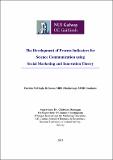| dc.description.abstract | Science surrounds our daily lives and is an integral component to the development of sustainable communities and societies. Science also contributes to the competitiveness and advancement of economies through their governing policies. Science policy formulation, both historically and presently, has been guided by authoritarian processes of oversimplification emphasising science and science communication as a product.
Science communication is currently shifting from the transitory periods of information and deliberation to public participation, which mobilises science as a process. Social marketing and innovation theory assist science communication in overcoming its product orientation by developing more integrated, open and proactive understandings of participatory processes for science-in-society. The foremost contribution of this study is the development of process indicators based upon the integration of science communication with social marketing and innovation theory to measure the non-linear and multi-dimensional nature of science.
This research contributes to a deeper and more integrative understanding of information, deliberation and participation in science communication. Social marketing and innovation theory emphasise the economic and social value to participation, as multiple levels of society co-integrate their ideas, knowledge and skill sets to co-produce and co-create participative processes for science communication. More specifically, this research allows policy makers and practitioners to focus on what is being co-ordinated; the system parts, their unique attributes and how participation is occurring between science communicators. Process indicators demonstrate that complex societal problems require multi-level and multi-directional participatory processes between diverse and conflicting stakeholder groups. Boundaries must be spanned and shared value networks co-created for experiential solutions to facilitate not just social good, but far-reaching societal change for science communication. | en_US |


